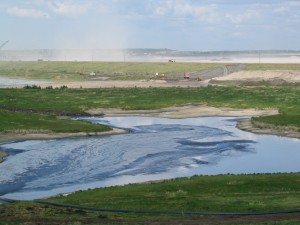Can, and should, the National Energy Board consider climate impacts before approving oil pipelines? The federal government says no, objectors say yes. Now the courts must decide.
The Trans Mountain Pipeline expansion would increase the capacity of the current 1,150 km pipeline between Strathcona County (near Edmonton), Alberta and Burnaby, British Columbia from 300,000 barrels/day to 890,000 barrels/day.
The City of Vancouver (Vancouver) and the Parents from Cameron Elementary School Burnaby (the Parents) and Danny Harvey, a Professor in the Department of Geography at the University of Toronto brought motions before the NEB arguing that upstream activities and downstream uses of the oil intended to be shipped in the pipeline should be included in the “List of Issues” that the board will consider in its environmental assessment of the project. In particular, they argue that the effect of greenhouse gas (GHG) emissions must be considered.
The NEB dismissed these motions.
The City of Vancouver announced that it will seek leave to appeal the NEB’s decision to the Federal Court of Appeal.
Upstream and downstream impacts are irrelevant to the NEB’s decision
The City of Vancouver and the Parents each filed motions requesting that the “List of Issues be expanded to include environmental and socio-economic effects associated with upstream activities, including development of the oil sands (upstream effects) and the downstream use of the oil intended to be shipped on the pipeline (downstream effects).” Their submissions focussed on the effects of GHG emissions from the production of oil sourced from the oil sands and the end use of that oil.
The NEB dismissed these motions, concluding that:
“The Board has the authority to determine what is relevant to it in fulfilling its mandate under the NEB Act. In the circumstances of this hearing, the Board does not consider that upstream and downstream effects, including those of GHG emissions, are relevant. The Board is mindful that the environmental and socio-economic effects of petroleum exploration and production activities in Canada are assessed in other federal and provincial processes that involve those conducting those activities, and that the end use of oil is managed by the jurisdiction within which that use occurs.”
This conclusion was based on their findings that:
- “The Project does not include upstream production and is not dependent on any particular upstream
development and; therefore, any link to environmental changes caused by such upstream
production is indirect and is not necessarily incidental to Project approval.” - “[N]o particular upstream development is dependent on the Project… It is not the Board’s recommendation
that could directly or necessarily cause growth in oil sands development with its accompanying
effects. It may contribute to that development, but the degree of that contribution is dependent on
demand and other transportation options available now or in the future.” - “Oil sands development is subject to provincial and federal environmental assessment processes.
Duplication of environmental assessments is discouraged…” - “The Project does not include downstream use and is not tied to, or dependent on, any particular use in any particular destination. Oil, whether from Canada or from elsewhere in the world, will go to where the
demand is, whether or not the Project proceeds. The effects of end use are not directly linked or
necessarily incidental to the Board’s regulatory process regarding the Project.” - “The Board agrees with Trans Mountain that downstream effects are more effectively assessed
and regulated by the jurisdictions where the use occurs.”
Failure to consider upstream and downstream impacts does not violate the Charter
Mr. Harvey’s motion argued that the List of Issues violated the rights to “life” and “security of the person” under s. 7 of the Charter by excluding the Project’s upstream and downstream environmental effects, including the Project’s contribution to climate change.
Citing the Supreme Court of Canada’s decision Operation Dismantle v. The Queen, the Board concluded that “A
section 7 claim cannot be founded on speculation as to effects that “may” happen.” Rather, the infringement must be “proven to result” from the challenged act.
The Board found that Mr. Harvey had not proven that an adverse effect on human health, due to the oil sand’s contribution to climate change, would result from their approval of the project.
Project scoping is critically important
In 2008, before the latest revisions to the Canadian Environmental Assessment Act (CEAA), Professor Meinhard Doelle described the importance and difficulty of scoping projects for environmental assessment (EA). His comments remain equally relevant today:
Scoping is a critical stage in the EA process. This is where key decisions are made that will affect what information will have to be gathered during the course of the EA process. The overall tension in the Act between the narrow objective of informing the final EA determination as to whether the project is likely to cause significant adverse environmental effects and the broader objective to inform and encourage integrated decision-making for sustainability is reflected in the scoping process. Under CEAA, the cases to date suggest that it is left to individual federal decision-makers to resolve this tension on a case-by-case basis. Narrow scoping under section 16 would limit the scope of factors to those relevant to the final determination of likely significance. Broader scoping would include additional issues that may not be relevant to the likely significance test but would assist responsible authorities to make integrated decisions in light of precaution and in the interests of sustainability.
The legal challenges to the NEB’s scoping decision in the Trans Mountain Pipeline expansion reflect public frustration, as foreshadowed by Prof. Doelle, with the perceived failure of government to make decisions about energy developments that consider sustainability and the precautionary principle. Where will the cumulative impacts of our energy decisions be considered if not before the NEB?

